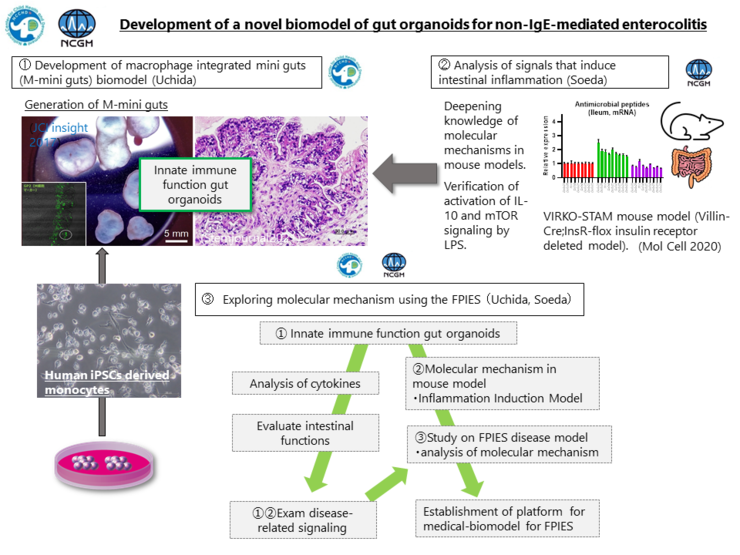Development of a novel biomodel of gut organoids for non-IgE-mediated enterocolitis
Abstract
In this study, we apply stem cell-based organoid technology to study food-protein-induced enterocolitis syndrome (FPIES) by exploring the disease mechanism on molecular levels, with a newly developing macrophage integrated intestinal organoid biomodel. Although the number of reported cases of FPIES has been increasing rapidly in Japan since the late 1990s, diagnosis and treatment of FPIES have not yet been established. Nearly 10% of cases are severe and cause life-threatening conditions such as necrotizing enterocolitis, massive hypovolemia, gastrointestinal obstruction and gastrointestinal rupture (Nomura I, et al. J Allergy Clin Immunol 2011). The very early onset of the disease also makes it very difficult to diagnose and treat, with about half of FPIES patients (Suzuki H, et al. Allergol Int 2020). Disturbance of cellular immunity as well as the nutritional environment may play a role in progression of the disease. In order to clarify the pathogenesis of FPIES and to promote the development of diagnostic and therapeutic methods, we apply the technology to produce organoids from human pluripotent stem cells to construct a macrophage-integrated intestinal immune response biomodel and to explore molecular programs of inflammatory response. We have developed a human pluripotent stem cell-derived intestinal organoid "mini-gut" with human intestinal functions such as peristalsis, absorption and secretion in vitro (Uchida H, et al. JCI Insight, 2017). The mini-gut is an extremely high-specification in vitro model of the human intestine that not only has various mucosal cells of the small intestine but also has an enteric nerve plexus and smooth muscle cells in the submucosal region, showing a tissue structure similar to that of the human intestine. In the molecular program analysis, we focus on macrophage-associated IL-10 molecular signaling, which Soeda et al. have revealed in a mouse model, and explore the molecular mechanism. Our research collaborator, Dr. Nomura, is a representative of the Ministry of Health, Labor and Welfare's FPIES policy research project, and will continue to promote this research and development based on the latest knowledge of clinical conditions. This project provides useful insights on the pathogenesis of FPIES, and will develop diagnosis and treatment of this disease through the collaboration of national centers.
Perspectives
- We provide scientific insights on food-protein induced enterocolitis syndrome (FPIES).
- A newly developed organoid biomodel is available for validating clinical findings of the pathology in vitro.
- It is expected to contribute to the development of clinical guidelines for FPIES.
Comments from principal researcher
Diseases of the gastrointestinal tract in childhood have a significant impact on overall health and development. An understanding of FPIES is essential for reliable diagnosis and the development of effective treatments. Our goal is to contribute to clinical practice for the healthy growth of children through our studies in vitro.

